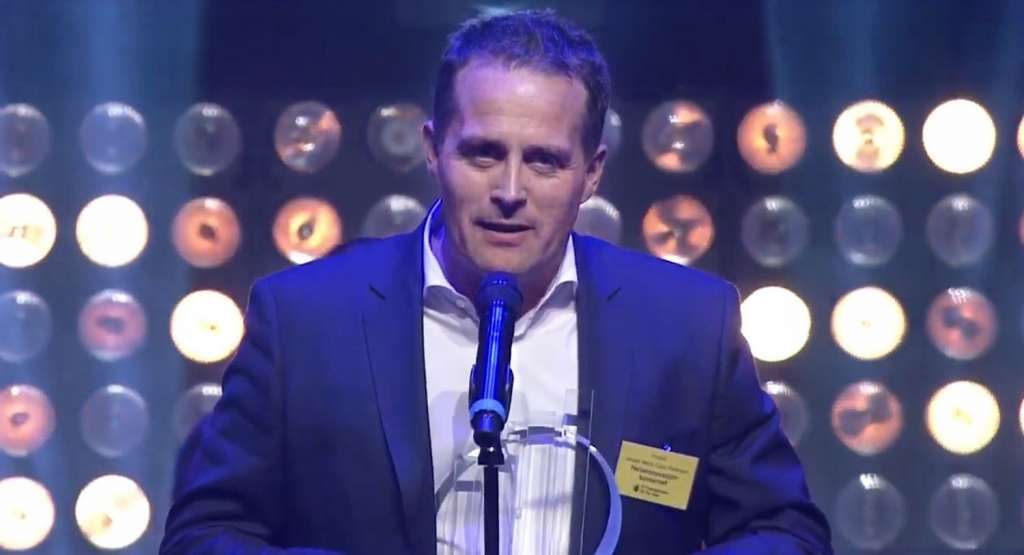By a commentator for Tjen Folket Media.
Jesper Melin Ganc-Petersen has made half a billion kroner from his debt collection business against the poor and sick people, while he and those around him live a life of luxury. People with debt collection claims against them experience prejudice, stigmatization, and humiliation for «living beyond their means». This is the bourgeoisie’s hypocritical attempt to hide what they are really doing: pushing poor people further down. And while they loot people’s right to healthcare, social democrats praise the fact that Norway has a free healthcare system, which every poor person knows is a lie.
The debt collection company has the task of demanding debt on the behalf of other companies, as well as public enterprises. They issue demands to both companies and individuals, people of different classes, but it is hardest on workers and the poor. Among the vast multitude of debt collection agencies, we have here chosen to focus on some of the largest debt collection agencies who operate in a manner that hits workers and the poor extra hard.
Disgracing the Poor with Debt
Debt collection agencies are let off easy in the media. In this article, they have been featured because of the insidious tactics they use to get extra money out of small claims. Dirty tactics and scams will once in a while get mention, but the generally parasitic role that the collection agencies play in regards to the poor is never written about.
On the contrary, there is a culture of describing the entire debt collection problem as a problem that regards «personal» economy. The focus lies almost exclusively on irresponsible, spoiled people who live beyond their means, who forget to pay their bills on time, and so on. Poverty as a problem is never mentioned in the debate. The lack of exposure on the world of debt collection in popular media shows this problem clearly. The «reality» TV program, Luksusfellen has opted out of all objective descriptions of the problem such that the episodes may follow the same formula: they meet a family or person, who is usually young. The person(s) have large debts, but live a good life. In the course of the program, somebody helps them find order in their personal economy by living simpler, selling things, creating accounting spreadsheets, and so on. The banks and the debt collection agencies are portrayed as helpful volunteers. And the program leader appears as a typical representative of these forces in society.
The disgrace when it comes to debt in society is enormous. The culture, through reports in media and popular culture, contributes enormously to this. They contribute to a belief that poor people with debts belong to a group of people who live beyond their means, are irresponsible, do not have control over their personal economy, and so on. They shift the focus and identification away from poverty, poor and unacceptable social security standards, unfair fines and replacement fees. This is a part of the rotten bourgeois culture that attempts to create mistrust and divisions among the people, rather than solidarity and a hatred that directs itself towards the real enemy.
Parasites on the Poor, Sick, and Vulnerable
Social democrats love to wax poetic about Norway in contrast to a number of other countries, who don’t have a universal healthcare system. Almost all of the poor people in Norway know that this is not true. Even if large sums are covered and one has a frikort, it is far from free, if not just as expensive as the US. And dental care for adults can bankrupt individuals and lead to deep debts.
The healthcare sector, both private and public, has several contracts with several large debt collection agencies. They must be considered to be an extraordinarily parasitic group among the debt collection agencies, which to large degrees live off of poor people who are in an especially vulnerable situation.
In Norway, one is typically not refused healthcare services based on the ability to pay and insurance status. But the reality for many poor people is that at the end of the month, they will often choose not to accept necessary health services simply because there is no money left in their account. Others live in debt because they chose to go to the doctor or the psychologist.
Healthcare is a right. But this right is being undermined and some are getting rich off of it. It would not be possible to undermine this right without the aid of the debt collection agencies.
Who Is Getting Rich Off of the Poor and Sick?
Melin Collectors AS has contracts with 80% of doctor’s offices in Norway for both their payment services and their collection services.
Melin Collectors AS lies along a long line of groups and parent companies led by owner Jesper Melin Ganc-Petersen. There are other small companies in the group, but Melin Collectors AS decidedly amounts for the largest values and income.

The founder and the group’s majority owner Jesper Melin Ganc-Petersen earned 552 million kroner on his company in 2017, collected 142 million in dividends, and had a net income of 132 million. And he owns half of the group HI Topco, where Melin Medical and Melin Collectors operate. According to their own accounts, the company owns over 2.1 billion kroners. Another part-owner is Johan Michelsen, who through different companies and groups owns 32% of the company.
In the past year, the owners have discussed selling the company according to media reports, at a speculated value of between 1.7 and 2 billion kroner. Jesper Melin Ganc-Petersen is, in other words, on the verge of becoming a billionaire based on his enterprise.
Jesper Melin Ganc-Petersen appears to be a fairly private person. But we can gain an insight on the luxuries to be found within his circle through CEO Ingvill Hestenes, who through the parent company Melin Medical AS collected a salary of over 1.9 million kroner in 2017. And also owns a minor stake in the group, which despite its relative size is worth nearly 10 million kroner. She tends to defend the company’s business in the media with bureaucratic smoke and mirrors in an attempt to hide the reality – that they live off of the poverty of sick people. On Instagram, she proudly presents her life of luxury with expensive travels, luxurious parties, pricey champagnes and wines, and a luxury wedding.
The company arrogantly enough claims to be involved in the healthcare sector, and is working towards making it more effective. How much damage Jesper Melin Ganc-Petersen’s way to extreme wealth has caused is impossible to estimate. But the business has without a doubt led to great suffering for poor and sick people. Either because they must choose not to use healthcare services, or because they are constantly being hounded by debt collection agencies, and typically both. It is not unthinkable that it has costed many lifes. In this article, we wrote about how the rich live much longer than the poor. There are many reasons for this, but Jesper Melin Ganc-Petersen surely carries a great deal of this responsibility.
Toll Money and Ticket Fees
We recently wrote about the luxury among the bosses in the toll companies. But the toll companies also have contracts with several debt collection agencies.
The toll company Fjellinjen has hired 3 different debt collection agencies to collect toll fees. They are already profitable companies with high salaries, and they can be expected to make considerable sums in the near future.
Large bus, ferry, and train companies often have controllers on-board to avoid losing money, something which has led to fees levied on poor people who ride without a ticket. Additionally, people have been weakened against unreasonable or erroneous fees. And here, there is a lot of money to be made on debt collections.
The State’s Collection Agency and the Police
Legal debt collection agencies in Norway do not themselves physically demand money or other value from anybody. And they themselves have no ability to take money from people’s accounts or garnish their wages. When a debt collection agency has placed a demand through the legal system, it goes to the Norwegian National Collection Agency. The Norwegian National Collection Agency can then take money from your income and directly from your bank account. They can also physically confront you and take your personal belongings in order to sell them. The Norwegian National Collection Agency can decide that people with debt are to live on a pre-determined subsistence level. The amount is very low and entails poverty. If one does not willingly give up their money or property, the Norwegian National Collection Agency will use police force. The rotten debt collection agencies in other words take from people everything they own and force them into deep poverty.
A Part of the Development
This is a part of the development of today’s rotten capitalism. In addition to stagnating wages and rising prices, we also see this part of the development. The right to healthcare is being undermined. And there has been an explosion in toll fees. Poor people are being attacked and violated. The bourgeoisie is getting rich off of yet another attack on people’s welfare.
Sources:
Financial Statements from Brønnøysundsregisteret
Proff.no
The Norwegian National Collection Agency
Statistics Norway (SSB)
Kjære leser!
Tjen Folket Media trenger din støtte. Vi får selvsagt ingen pressestøtte eller noen hjelp fra rike kapitalister slik som rasistiske “alternative medier”. All vår støtte kommer fra våre lesere og fra den revolusjonære bevegelsen. Vi er dypt takknemlige for dette. Vi overlever ikke uten, og du kan gjøre ditt bidrag ved å støtte oss med det du kan avse.
